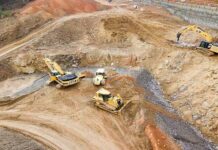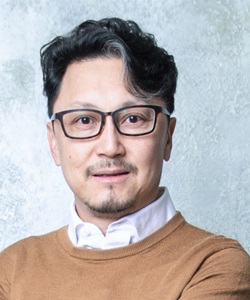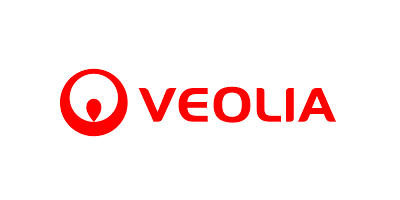World Construction Today, recently had a one-on-one session with Jeffrey Yau, the Commercial Director (Asia) – Plastic Recycling at Veolia, where he spoke extensively on PlastiLoop which generates and offers high-quality recycled plastics throughout various sectors. PlastiLoop happens to supply a constellation of recycled resins such as polystyrene- PS, polyethylene- PE, polypropylene- PP, and also polyethylene terephthalate- PET which can be utilised in a very productive and process-driven way across the massive building and construction sector.
Here’s the Q&A which we are sure to keep you absorbed and acquainted with all things PlastiLoop.
1. Can you elaborate on the core mission of PlastiLoop and how it aligns with Veolia’s overall sustainability goals?
PlastiLoop’s core mission is firmly rooted in Veolia’s overarching vision to be a leader driving ecological transformation globally. Through the Group’s three complementary business activities (water, waste, and energy management) and the GreenUp Strategic Program, Veolia is dedicated to regenerating resources, treating pollution, and reducing carbon emissions.
PlastiLoop directly supports this mission by focusing on regenerating plastic resources and providing high-quality recycled plastic resins as an environmentally friendly alternative to virgin materials across various industries. By enabling a circular economy for plastics, PlastiLoop minimises the environmental impacts associated with plastic production and waste.
Our comprehensive portfolio includes recycled resins like PP, PE, PS and PET tailored for applications spanning packaging, automotive, construction, textiles, appliances, industrial manufacturing and agriculture. These circular polymer offerings facilitate the transition towards more sustainable practices while optimising resource utilisation.
PlastiLoop’s mission addresses the three major challenges that Veolia has identified as critical to accelerating ecological transformation: fighting climate change, treating pollution, and optimising resources. Our recycled resins reduce greenhouse gas emissions and resource consumption compared to virgin plastics derived from fossil fuels. Simultaneously, we divert plastic waste from landfills and the environment.
In essence, PlastiLoop acts as a catalyst for Veolia’s vision, harnessing innovation to regenerate plastic resources, minimise ecological impacts, optimise material loops, and drive the transition towards a low-carbon, circular and resource-efficient economy.
2. What distinguishes PlastiLoop from other plastic recycling solutions available in the market?
We set ourselves apart through our comprehensive, structured approach to providing high-quality circular polymer solutions tailored to diverse industry needs. While increasing recycled material usage is crucial for brands to meet sustainability commitments, we go beyond simply offering recycled resins.
Our product portfolio is strategically organised into over 90 specialised grades across 33 series, each series addressing the potential applications and requirements within 7 major sectors – packaging, automotive, textiles, construction, appliances, industrial manufacturing, and agriculture. This structured range is the most complete circular polymer offering globally.
What truly differentiates PlastiLoop is our unique expertise honed over decades to engineer recycled resins that meet and exceed our industrial clients’ exact commercial and technical specifications. We leverage specialised formulations, additives, and reinforcements to achieve properties on par with virgin materials for even the most demanding applications.
Moreover, PlastiLoop acts as a strategic partner collaborating to structure localised, sustainable value chains around our customers’ business challenges. We provide flexible business models tailored to each market’s dynamics, sustainability commitments, and requirements. This partnership approach helps mitigate exposure to oil price volatility.
By giving value to recycled plastics as a high-performance material source, PlastiLoop empowers brands to make impactful environmental choices. Our solutions facilitate the integration of recycled content while ensuring quality, compliance, and performance.
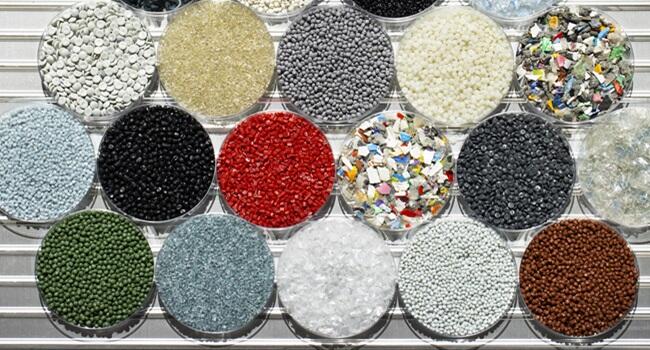
3. With nearly 40 facilities across 14 countries globally, how does PlastiLoop ensure consistent quality and scalability in its operations?
PlastiLoop has an extensive operational footprint in Asia with multiple innovative recycling facilities strategically located across major markets in the region—including China, Indonesia, Japan, and South Korea—where we have implemented robust systems and processes to maintain consistent quality standards and enable scalability in our operations.
China is home to our joint venture Veolia Huafei Group, a specialised facility for post-consumer recycled (PCR) plastic production. Leveraging advanced European recycling technologies, this plant manufactures high-quality 100% PCR resins including PET, PP, HDPE, and other engineering-grade plastics widely recognised by brand owners. These materials find applications across filaments, packaging, automotive, electronics, and consumer goods industries.
In Indonesia, we have partnered with Danone Aqua to establish the nation’s largest PET bottle recycling facility in Pasuruan. Equipped with innovative recycling technology, this plant processes over 1 billion PET bottles yearly into 25,000 tonnes of food-grade pellets, enabling a closed-loop recycling system. Additionally, it provides employment for 225 local community members while ensuring Danone meets its 2025 recycled content targets.
Japan serves as a key recycling hub for Veolia, where we operate three plants with a combined capacity of over 110,000 metric tons, establishing us as a leader in the country’s plastic recycling sector. Our Japanese facilities recycle post-consumer and industrial plastic waste into ready-to-use secondary raw materials for customers. Noteworthy assets include the Circular PET Tsuyama plant, producing 25,000 tons of food-grade PET annually
In South Korea, PlastiLoop’s focus is on PP recycling through facilities like Doksan/DSPL, specialised in pelletising and compounding recycled PP resins. We also operate R&E, the world’s first eco-friendly pyrolysis plant dedicated to recycling waste artificial marble.
Spanning this extensive Asian network, we integrate cutting-edge recycling technologies, decades of accumulated expertise, and localised circular value chains to manufacture high-quality recycled resins tailored to customer requirements.
4. Can you share insights into the technological processes used at these facilities to achieve a production capacity of 250,000 tonnes of recycled polymer annually?
We employ a range of advanced mechanical and chemical recycling processes tailored to different plastic waste streams.
For mechanical recycling, our facilities utilise AI-powered robotic sorting systems that leverage machine learning to effectively identify and separate various plastic polymers like PET, PP, HDPE from mixed waste streams with high accuracy. Near-infrared spectroscopy and optical sorting complement this to further enhance sorting efficiency and purity.
The sorted plastic fractions then undergo size reduction, washing, and extrusion to remove contaminants and produce high-quality recycled polymer pellets. We also incorporate specialty equipment like melt filters to ensure our recycled resins meet stringent quality requirements.
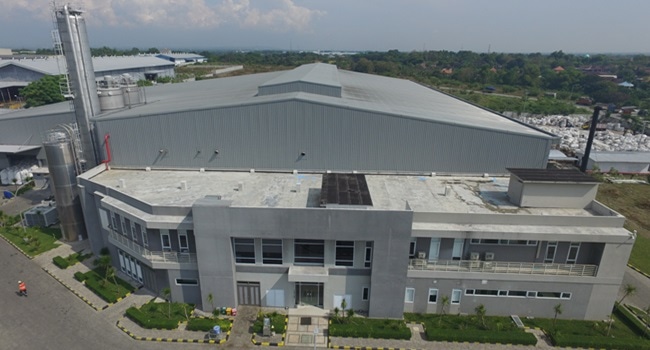
Across our facilities, we integrate real-time digital monitoring systems and automated process controls to continuously optimise material flows, minimise losses, reduce energy consumption and enhance overall operational efficiency.
Our on-site R&D laboratories play a pivotal role, conducting rigorous testing on inbound feedstock and outgoing recycled polymers to ensure conformity with regulations, certifications like FDA/EFSA for food-contact, and our customers’ specifications.
By harmonising sorting, size reduction, washing, extrusion, pyrolysis and digital technologies within our strategically located Asian recycling hubs, PlastiLoop can produce over 250,000 tonnes annually of high-quality circular polymers tailored to diverse industry needs.
5. PlastiLoop serves seven industries with over 200 resin grades. Could you highlight how these tailored solutions are making a difference in key sectors such as packaging or automotive?
At PlastiLoop, we understand that transitioning to sustainable circular polymers requires tailored solutions that meet the stringent performance and regulatory demands of each industry. Our extensive portfolio of over 200 grades organised across 33 product series allows us to deliver customised recycled resins optimised for applications in the 7 major sectors.
In the packaging industry, our recycled PET, HDPE, LDPE and PP grades are enabling brands to increase recycled content in bottles, containers, films and other packaging formats while maintaining properties like clarity, mechanical strength and barrier protection on par with virgin plastics. For example, our food-grade PET resins produced from recycled bottles facilitate closed-loop recycling for beverage companies.
For automotive applications, we offer engineered recycled PP compounds reinforced with additives and fillers to achieve the required mechanical performance, chemical resistance and lightweight properties for interior and exterior vehicle parts. Our recycled PP and ABS resins meet the quality standards and regulatory compliance of this industry.
What truly sets PlastiLoop apart is our unique expertise in material science and formulation capabilities. We can customise each recycled resin grade, blending in specialised additives, impact modifiers, UV stabilisers and other functional ingredients to tailor properties like processability, thermal resistance, and aesthetics based on specific application requirements.
Moreover, our solutions integrate seamlessly with our clients’ operations. We structure localised supply chains, offer flexible business models based on market dynamics, and provide compliance documentation – enabling a smooth transition to circular polymers that meet sustainability targets while mitigating risks.
6. How does PlastiLoop address specific challenges that industries face when transitioning to sustainable practices?
We recognise that the transition towards sustainable circular practices poses unique challenges for different industries. As part of Veolia’s commitment to the UN Sustainable Development Goals, we take a holistic approach to tackling these obstacles head-on.
Firstly, we understand that recycling infrastructure, regulations and policies can vary significantly between regions. PlastiLoop leverages Veolia’s global network and regulatory expertise to adapt our solutions and tailor our approach for diverse local waste management systems and compliance requirements.
Ensuring regulatory compliance is another key challenge as standards continuously evolve. Our manufacturing has stringent quality controls, traceability protocols, and third-party certifications like FDA and EFSA to ensure conformity. Our data-driven tools like GreenPath also provide environmental footprint transparency.
We also prioritise locally sourcing feedstock near our strategically located recycling hubs to minimise transportation emissions and Scope 3 impacts. This localised model fosters circular ecosystems within communities.
Moreover, we recognise that sustainable transformation requires systemic collaboration across the value chain – from eco-design for recyclability to effective collection, sorting and recycling solutions for all waste streams. We actively engage stakeholders to drive collective progress.
Technology also plays a pivotal role in enhancing efficiency and environmental performance. Our global network provides extensive experience with cutting-edge sorting technologies like AI robotics, optical sensors and ballistic separators to produce high-quality recycled materials. We also implement innovative chemical recycling processes to tackle hard-to-recycle plastics.
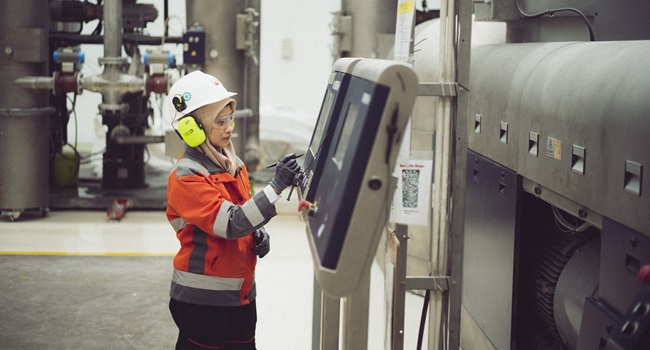
7. What measures does PlastiLoop take to ensure compliance with regional and global environmental regulations?
At PlastiLoop, ensuring stringent compliance with all applicable environmental regulations across the regions we operate in is a top priority. We have implemented a comprehensive framework with multiple layers of controls and measures.
First and foremost, we maintain close collaboration with Veolia’s extensive global network of regulatory experts who provide guidance on waste management policies, plastics regulations, and environmental standards specific to each country and region. This allows us to stay ahead of evolving requirements.
Our manufacturing facilities integrate quality control protocols developed through Veolia’s decades of experience to meet or exceed relevant certifications like FDA, EFSA, EuCertPlast, Global Recycled Standard, RoHS, Recyclass, and Halal. Dedicated food-grade production lines ensure strict compliance for food-contact applications.
Traceability is another critical component. We enforce stringent traceability of all feedstock materials from reception through the initial production stages. Tightly controlled feedstock selection protocols further ensure conformity with regulations governing recycled content.
Our cutting-edge recycling technologies like AI-robotic sorting, near-infrared spectroscopy and pyrolysis play a key role in producing high-quality recycled polymers that meet purity and composition criteria across regions. On-site laboratories conduct rigorous material analyses against specifications.
Furthermore, PlastiLoop’s solutions are designed to support our customers’ own compliance efforts and reporting obligations. We provide comprehensive documentation and data validation to demonstrate the environmental benefits of our circular polymers.
8. How do you balance the environmental impact and economic feasibility of recycling operations in Asia?
We take a holistic approach to balancing environmental sustainability and economic viability for our recycling operations across Asia. This multifaceted strategy encompasses strategic facility locations, advanced recycling technologies, data-driven optimisation, stakeholder collaboration, and quantifying environmental benefits.
A key enabler is our network of strategically located recycling hubs across major Asian markets. This regional presence allows locally sourcing feedstock, minimising transportation emissions and Scope 3 impacts while fostering circular ecosystems within communities. Prioritising local sourcing reduces costs associated with long-distance logistics.
Our facilities integrate best-in-class technologies like AI-robotic sorting, near-infrared spectroscopy and chemical recycling processes like pyrolysis. These solutions maximise recycling rates, material quality and the range of plastics we can process – enhancing both environmental performance and economic yields. Digital monitoring systems like GreenPath also optimise energy use, minimise waste, analyse emissions footprints, and identify areas for further eco-efficiency gains. This data-driven approach boosts environmental and economic sustainability.
Crucially, PlastiLoop’s economic model is centred around providing high-quality recycled resins tailored to customer needs across various sectors. Our expertise in engineering customised polymer grades with properties on par with virgin materials ensures robust market demand and value creation.
We also collaborate extensively with stakeholders like governments, industries, and scientists to collectively address challenges, create new circular business models, access cost-effective technology solutions, and ensure compliance – enhancing long-term economic viability.
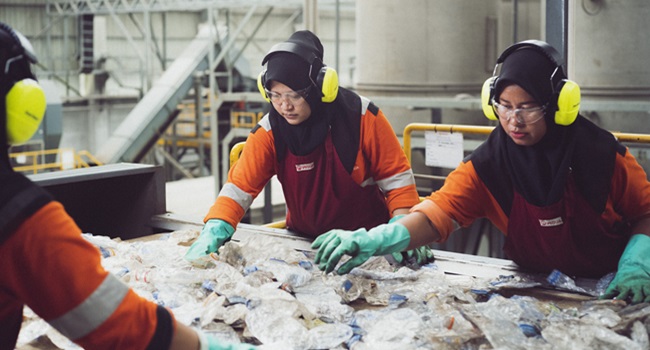
9. What are the primary challenges PlastiLoop faces in the Asian recycling market, and how are you addressing them?
The awareness of ESG among brand owners presents a significant challenge, particularly due to the lack of regulations mandating the use of post-consumer recycled (PCR) materials in their products, especially in packaging and automotive sectors; producing high-quality products requires dedication from brand owners. To tackle this issue, we collaborate with our primary clients, generally global key accounts across various regions, to create the most innovative compounds tailored to their specific needs while aiding them in achieving their global ESG objectives.
In Asia, individual nations have established their unique strategies for reducing plastic waste and enhancing recycling based on their market circumstances, leading to the creation of diverse policies at various regulatory phases. Furthermore, different countries have implemented distinct formal and informal collection systems, resulting in varying levels of feedstock quality, which adds layers of complexity to the execution of PlastiLoop projects throughout Asian markets.
Nevertheless, leveraging our extensive global network and experience, Veolia PlastiLoop applies its top expertise to assist brand owners in achieving their sustainability targets by providing high-performance, consistently high-quality recycled PCR that help reduce the reliance on virgin plastics and lower carbon emissions.
10. Are there any upcoming innovations or expansions planned for PlastiLoop’s operations in Asia?
Our expansion strategy is driven by our client’s needs and our commitment to promoting a circular economy. While we’re open to further growth in Asia or elsewhere, any expansion will be contingent on strong client commitment and alignment with our sustainability goals. We’re prepared to support our clients wherever their circular economy initiatives take them, whether within our current footprint or in new geographies.
11. How does PlastiLoop contribute to creating a circular economy for plastics in the region?
PlastiLoop takes a comprehensive approach to driving the circular economy for plastics across the region. A key enabler is our extensive product portfolio – the most complete global offering of over 200 circular polymer grades tailored to meet diverse customer needs across 7 major industries.
Our solutions empower brands to reduce virgin plastic usage, conserve resources, lower emissions and minimise pollution, all while maintaining quality and performance. This facilitates their transition towards more circular production and consumption habits aligned with evolving regulations.
Crucially, PlastiLoop provides an entire ecosystem of solutions beyond just circular polymers. Our global network of over 1,000 experts across 14 countries brings cutting-edge technological expertise in collection, sorting, recycling, formulation and digitalisation. Dozens of Veolia scientists continuously innovate localised solutions through stakeholder consultations.
Our on-site laboratories ensure stringent quality control through rigorous testing on incoming feedstock and outgoing materials. This quality focus, combined with guaranteed compliance and full value chain traceability, instills confidence in our circular offerings.
PlastiLoop also partners with customers to structure localised, sustainable value chains tailored to their markets and sustainability commitments. Our flexible business models create value for recycled plastics while mitigating exposure to oil price volatility.
Overall, PlastiLoop accelerates the region’s transition by providing innovative recycling solutions, tailored circular resins, sustainability partnerships, technological expertise and a promise to drive fundamental transformations in quality, environment, traceability and responsible practices.
12. Could you provide examples of partnerships or collaborations with businesses that have successfully integrated circular practices through PlastiLoop?
L’Oréal has been a key global customer and a strong supporter of our PlastiLoop recycled plastics. This collaboration aligns with L’Oréal’s ambitious goals outlined in their 2022 Plastic Packaging Policy to significantly reduce virgin plastic usage and accelerate the adoption of recycled plastics across their product packaging.
As of 2023, an impressive 26% of the plastic utilised in L’Oréal’s packaging originates from recycled or biobased sources, with a remarkable 85% of their PET content derived from recycled materials. L’Oréal has set a target to achieve 50% of their plastic packaging from recycled or biobased sources by 2025, further raising the bar to 100% by 2030.
The recently released Ellen MacArthur Global Commitment 2024 Report commends L’Oréal as one of the leading FMCG companies making significant strides. Notably, the percentage of post-consumer recycled (PCR) content in L’Oréal’s plastic packaging soared from 5% in 2019 to an impressive 32% in 2023, totalling 50,000 tons. This remarkable achievement, resulting from the synergistic collaboration between L’Oréal and Veolia, underscores our shared dedication to sustainability and our unwavering efforts to ensure the sustainability of our services and products.
In a concerted effort to reduce the carbon footprint of cosmetic packaging, L’Oréal and Veolia have joined forces to establish a circular economy for plastics. Veolia is supplying L’Oréal with high-quality recycled plastic globally, which can eliminate between 50% and 70% of CO2 emissions compared to traditional bottles made from virgin plastic. Since 2021, Veolia PlastiLoop in China has been providing L’Oréal with innovative plastic recycling products and services. In 2024, the two companies have expanded their collaboration to encompass a broader range of recycled plastics. The Veolia China Huafei plant is now supplying L’Oréal with recycled polypropylene (r-PP) and recycled PET (r-PET), in addition to recycled high-density polyethylene (rHDPE) in their plastic portfolio.
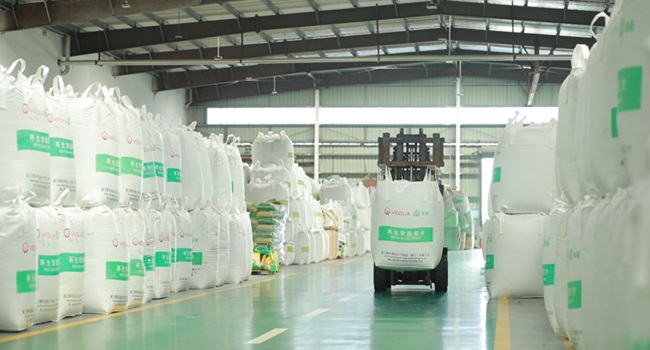
13. What is your vision for the role of PlastiLoop in driving sustainable recycling practices in Asia over the next decade?
With the launch of the Veolia GreenUp strategic program, PlastiLoop is assuming a key role in the areas of depollution, decarbonisation, and resource regeneration for plastic applications worldwide. In Asia, we will continue to collaborate with major brand owners to promote and adapt the use of traceable, high-performance recycled plastics. Additionally, we can support brand packaging designers by offering our CIRCPACK™ services to create more recyclable packaging using PlastiLoop’s post-consumer recycled (PCR) materials.







